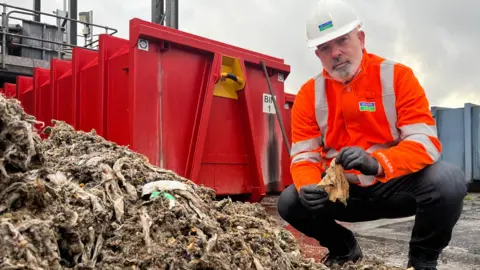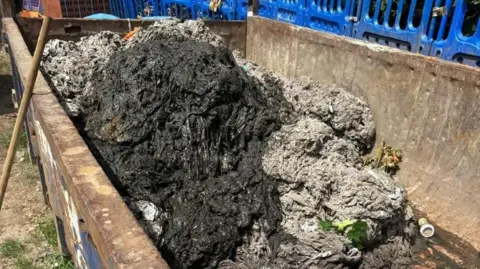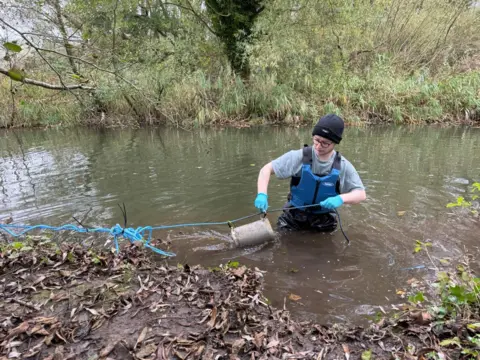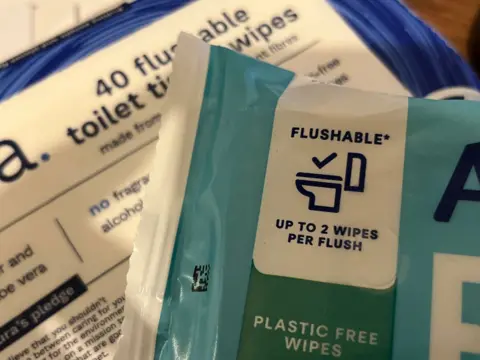So long, plastic wet wipes – but should we be flushing the new ones?
9 hours ago
 Jonah FisherEnvironment correspondent
Jonah FisherEnvironment correspondent

 Jonah Fisher/BBC
Jonah Fisher/BBCLong the scourge of water companies for blocking pipes, a ban on the sale of wet wipes made of plastic will be signed into law later today.
The new rules will come into force in 2027 and will bring England into line with legislation across the rest of the UK.
Plastic wipes don’t disintegrate when flushed down the toilet, so when oil and fat congeal on them, so-called fatbergs form in sewers, which water companies say cost them £200m a year to clear.
Most of the wipes that are sold in the UK are now made of non-plastic materials but the government and water companies say they should not be labelled as “flushable” because they can still cause blockages.
The wet wipe manufacturers contacted by the BBC said their non-plastic “flushable” wipes have been thoroughly tested and comply with all the rules.

 PA Media
PA MediaFatbergs can become huge if the blockage is not cleared.
Just last month a massive stinking lump of wet wipes, fat and oil was removed from a west London sewer. It weighed the same as eight double-decker buses and took a specialist team more than a month to break down.
The market for wet wipes has been growing steadily for years. According to government figures in 2023, 32 billion wipes were sold to UK consumers of which about 12 billion contained plastic. If they were all laid out flat that’s enough to cover 2,200 football pitches with plastic wipes.
Though they welcomed the new legislation for England, water industry sources were also quick to point out its limitations.
UK companies will still be able to manufacture and export plastic wet wipes, and they will still be available for people to buy from pharmacies both in person (behind the counter) and online. Businesses like hotels will be allowed to buy the wipes, without restrictions.
The medical profession successfully argued for an exemption from the wet wipe ban, arguing that non-plastic wipes absorb too much of the detergents and disinfectants impregnated in them, with potential consequences for patient safety.
At Minworth Wastewater Treatment works in the Midlands the scale of the current problem can be both seen and smelt.
Minworth serves a population of more than two million people across Birmingham and the Black Country and Severn Trent, who run the facility, say 10 tonnes a day of wet wipes end up here.
“It’s a nightmare,” Grant Mitchell, Severn Trent’s head of blockages says, as we survey a small mountain of wipes.
He’s just shown us the area where the “un-flushables” are filtered out from the sewage. It’s grotty stuff. There are dead rats, a rubber duck as well as a huge ball of soiled wipes.
“Wet wipes are a problem because they’re made to not break down like toilet paper,” he says. “So they stay in one piece, and they gather together with fat, oil, and grease from kitchens, congeal and create a fatberg which causes flooding.”
Also on hand at Minworth is Emma Hardy the Minister for Water and Flooding.
“It’s going to make a huge difference,” Emma Hardy, the Minister for Water and Flooding, said of the ban as we sheltered from the rain at Minworth. “I think people maybe underestimate the amount of problems that these wet wipes cause.”

 Daniel Jolly/University of East Anglia
Daniel Jolly/University of East AngliaWhile many brands say their wipes are “flushable” and environmentally friendly, whether they can and should be disposed of down the toilet is being questioned.
Daniel Jolly is researching how fast these biodegradable wet wipes break down. In a lab at the University of East Anglia in Norwich we watch as he simulates what a toilet flush does to a wipe.
“This isn’t toilet paper” he says as the wipe slowly breaks apart into fibres while he stirs the water inside an tank. “Even though it’s the same basic materials, this is built completely differently and it’s much stronger.”
Jolly has been carrying out tests on the banks of the River Yare to see how quickly the plastic-free wipes disintegrate.
“It’s a period of most likely months to a year, or two years, depending on the environmental conditions that they’re in,” he says.
“That’s much slower than toilet paper which is between weeks to several months, but much better than a plastic wipe which can last hundreds, even thousands of years in certain situations.”
Research commissioned by the government found that some non-plastic wipes failed tests on how fast they disintegrated, meaning they could still block sewers.
Jolly is now looking at what impact the biodegradable wipes have on aquatic life as they fall apart.

 Jonah Fisher/BBC
Jonah Fisher/BBCUntil March 2024 the water companies ran a certification scheme which gave the green light for some wipes to be put in the toilet, called “Fine to Flush”. But that was discontinued because of fears it was causing confusion among consumers and replaced with a new slogan “Bin the Wipe”.
Now the advice from the government and the water companies is very clear. Only the three P’s – pee, paper and poo should be put down the toilet.
“Restricting the sale of wet wipes containing plastic is a step in the right direction,” said a spokesperson for Water UK, the industry’s trade body. “But we really need a ban on their manufacture and mandatory ‘do not flush’ labelling on all wet wipes.”
Some of the manufacturers who market “flushable” wipes told the BBC that they were in fact moist toilet tissues, but Water UK said it still viewed them as wet wipes so they shouldn’t be flushed.
“I would encourage them [the wet wipe manufacturers] to show leadership on this right now,” says Minister Hardy.
“Instead of marketing them as being flushable, provide labelling to inform the public that they need to bin them and not flush them down the toilets.”
Additional reporting by Gwyndaf Hughes